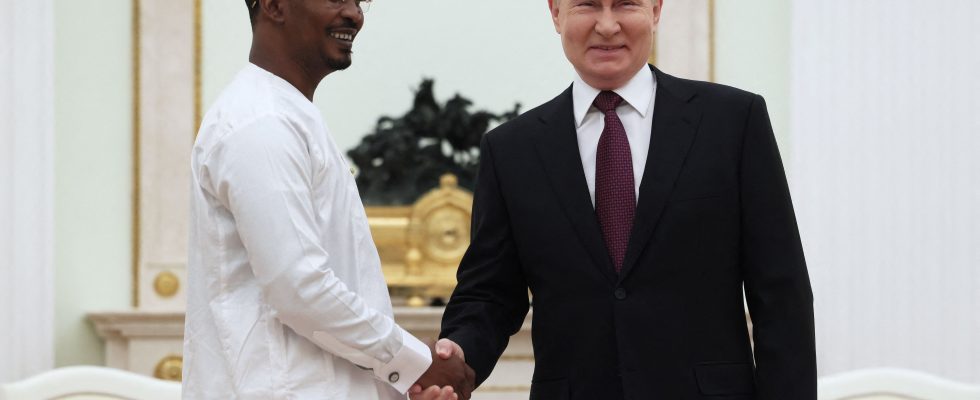The souvenir photo features prominently in Chapter II of Mahamat Déby’s autobiography, inserted before the printing of this program book published for the presidential election on May 6. Dressed all in white, the Chadian head of state shakes hands with Vladimir Putin, over the moon. The meeting, immortalized in January 2024 in Moscow during a visit intended to “strengthen its relations with a friendly country” – says “Déby junior” – is a small victory for the Kremlin, ready to do anything to extend its influence in Chad, France’s last ally in the region.
This May 6, Mahamat Déby hopes to legitimize his presidency at the polls, taken by force by a constitutional coup d’état after the death of his father in 2021. The vote leaves little doubt, as the opposition is reduced to silence. But a major unknown remains regarding the future of relations with the Elysée.
Driven out of the Central African Republic, Mali, Burkina Faso and Niger, the French army took refuge with its lifelong “friend”. For decades, Paris has cultivated a special relationship with the very authoritarian Déby clan. In February 2019, the French general staff did not hesitate to use its Mirages to bomb the columns of rebels threatening the regime. A thousand soldiers are still positioned in the country. But for how long ?
“Russia has a military presence in four of the six countries bordering Chad and has every interest in tilting this state to build an anti-Western alliance,” notes Cameron Hudson, researcher at the Center for Strategic and International Studies in Washington. At the heart of this war of influence, Déby wants to have both sides to best ensure his future. He first relied on the blessing of France to gain power, but wants to diversify his support and sees clearly that the break with it. Westerners is a popular argument among young urban dwellers.”
“The Russians will use every opportunity for contact”
However, history was off to a bad start with the Russians. April 2021: Idriss Déby Itno, in power for thirty years, dies “in combat” in a clash with rebels from the Front for Alternation and Concord in Chad (Fact), reputed to be close to the Wagner militia. Two years later, the same group planned, according to American intelligence, to assassinate his heir, Mahamat Déby.
But Moscow does not put all its eggs in one basket. For months, personalities from the Chadian political class, pro and anti-regime, paraded in Russian pharmacies. Members of the presidential cabinet were contacted, including Déby’s half-brother. “When it wants to enter a country, Russia is ready to go through the door… or through the window, continues former CIA analyst Cameron Hudson. For example, in neighboring Sudan, Moscow first engaged, before the war, formal negotiations with the armed forces to obtain a port on the Red Sea failed, the Wagner group took over to do business with the paramilitary Rapid Support Forces (RSF), now in Germany. war with the armed forces.” An alliance that the Russians could use to extend their influence. At the head of the FSR, the formidable general Mohamed Hamdan Daglo known as “Hemetti” has entered the top of the Chadian state. The soldier is none other than the cousin of a leader of the Déby clan: Bichara Issa Djadallah, last chief of staff of Idriss Déby and now advisor to his son.
“The Russians will use all opportunities for contact with the Chadians,” said Abderrahmane Ali Gossoumian, national coordinator of CSAPR, a network of Chadian civil society organizations. Their partner in Libya, warlord Khalifa Haftar, could also be a point-of-contact.” The same goes for the Sahelian states now sponsored by Putin. A Chadian delegation visited Burkina Faso, Mali and Niger at the beginning of April, led by three pro-Russian juntas and signatories of a mutual defense pact.
Faced with increasingly strong citizen pressure to break with France, will Mahamat Déby cross the Rubicon once the election is over? The temptation is great, especially since Moscow can provide the president, as well as its neighbors, with a very useful praetorian guard.
“The real question is whether France will choose to leave on its own terms or be kicked out of the country. Unfortunately, I fear it will be the second option,” laments Cameron Hudson. In any case, no plan B seems to be on the agenda for Paris. Visiting N’Djamena on March 7 – a week after the murder of an opposition leader, Yaya Dillo, by security forces – Emmanuel Macron’s personal envoy to Africa, Jean-Marie Bockel assured: “Of course, we must stay and we will stay.” Too bad if, for that, it is necessary to express all of France’s “admiration” for President Déby.
.
